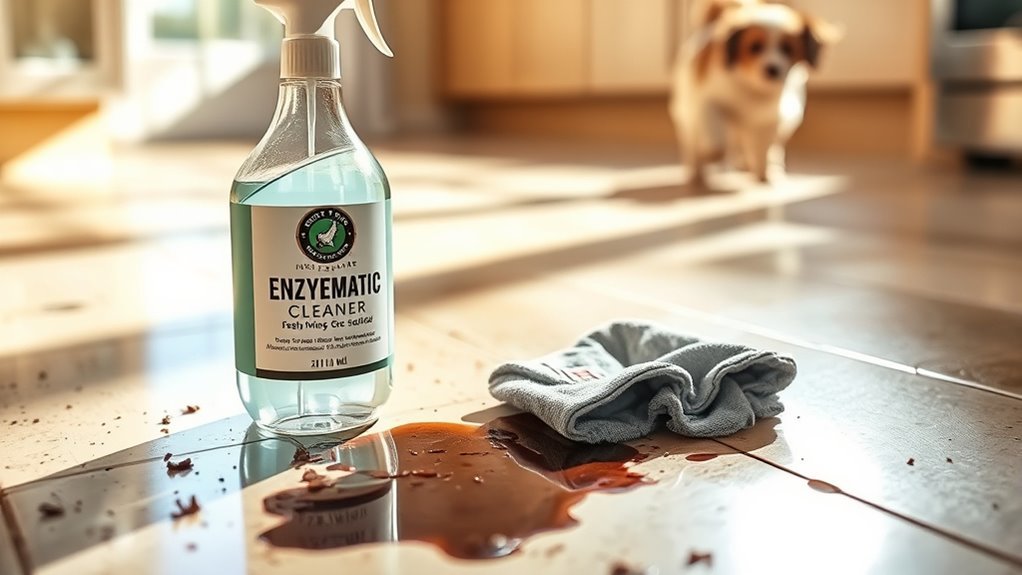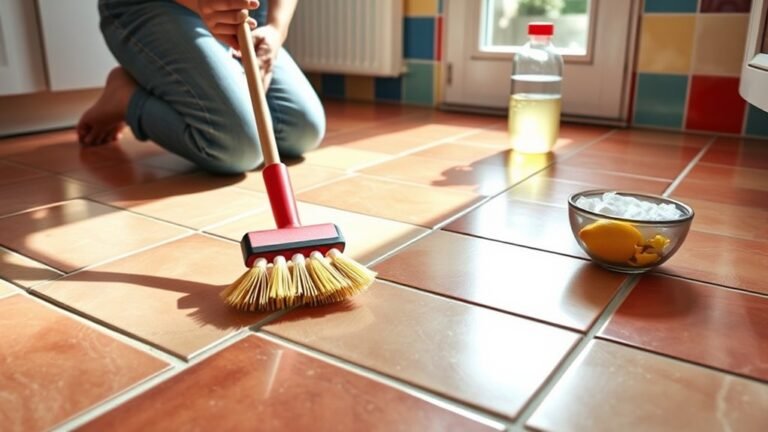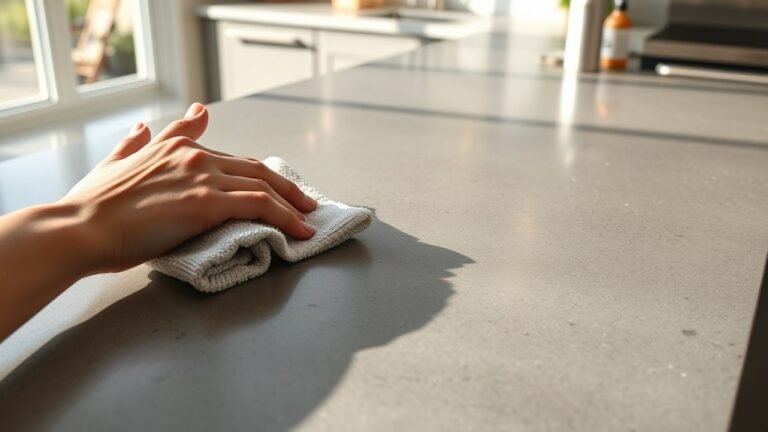Cleaning With Pet Mess: What Works and What Doesn’T
When cleaning pet messes like urine or fur, act fast to prevent stains and odors. Use enzymatic cleaners—they break down odors instead of just masking them. Avoid harsh chemicals like bleach or ammonia, which can irritate pets and worsen smells. Natural remedies like vinegar and baking soda work well for deodorizing. Regular vacuuming and prompt cleanup keep your home fresh. If you want tips on handling delicate surfaces and preventing future messes, there’s more helpful info ahead.
Common Types of Pet Messes and Their Challenges

Although pet messes come in many forms, you’ll most often deal with accidents like urine spots, vomit, and shedding fur. These common problems can quickly limit your freedom to relax and enjoy a clean space. Urine odor is one of the trickiest challenges because it tends to linger and can seep into carpets and furniture if not addressed promptly. Fur shedding, on the other hand, is a constant annoyance, especially if your pet has a thick coat. It spreads everywhere—on clothes, furniture, and floors—making it hard to keep your home feeling fresh. Understanding these challenges helps you stay ahead, maintaining a living space that lets you and your pet enjoy freedom without the burden of mess.
Effective Cleaning Solutions for Pet Stains
When pet stains happen, acting quickly is key to preventing lasting damage and odors. You want to tackle the mess before it sets, using effective stain removal techniques designed specifically for pet messes. Start by blotting the area gently—never rub—as that only spreads the stain. Use enzymatic cleaners that break down proteins in urine, feces, or vomit, making the stain and smell vanish. Avoid harsh chemicals, as they can damage surfaces and irritate your furry friend. Consistently applying pet mess prevention strategies, like prompt cleanup and designated pet areas, helps keep your home fresh and stain-free. By mastering these techniques, you reclaim your space with ease, enjoying freedom from stubborn pet stains while maintaining a clean, welcoming environment.
Natural Remedies That Actually Work

When tackling pet messes, you’ll find natural remedies like vinegar and baking soda are surprisingly effective. Enzyme-based cleaners target stains and odors at their source, making cleanup easier. Plus, lemon juice offers a fresh, natural way to brighten and deodorize affected areas.
Vinegar and Baking Soda
If you’re dealing with pet messes, vinegar and baking soda can be your go-to natural cleaners. Vinegar benefits include deodorizing and breaking down stains, while baking soda neutralizes odors and lifts grime without harsh chemicals. Using these two together gives you a powerful yet safe way to reclaim your space and freedom from pet odors and messes. Here’s a quick look at how each works:
| Cleaner | Action | Benefit |
|---|---|---|
| Vinegar | Breaks down stains | Removes odors naturally |
| Baking Soda | Absorbs moisture | Neutralizes smells |
| Combo | Fizzes to lift debris | Deep cleans surfaces |
| Safe & Cheap | Non-toxic solution | Pet and family friendly |
You’ll appreciate how simple this duo makes cleaning, freeing you to enjoy your home again.
Enzyme-Based Cleaners
While vinegar and baking soda tackle stains and odors effectively, they don’t always eliminate the root cause of pet messes. That’s where enzyme-based cleaners shine. These natural remedies break down organic matter at a molecular level, ensuring deeper cleaning and odor removal. When you compare cleaner options, enzyme efficacy stands out because it targets proteins, fats, and starches left behind by your furry friends. Unlike traditional chemical cleaners that mask smells, enzyme cleaners neutralize them, giving you real freedom from recurring odors. If you want a solution that works beyond surface cleaning, enzyme-based products are your best bet. They’re safe, eco-friendly, and designed specifically for pet messes, making your cleaning routine more effective without harsh chemicals.
Lemon Juice Benefits
Because pet messes can leave stubborn stains and lingering odors, lemon juice offers a natural, effective way to tackle both. You don’t need harsh chemicals when lemon juice acts as a powerful natural disinfectant, breaking down grime and neutralizing smells. Simply apply fresh lemon juice to the affected area, let it sit for a few minutes, then wipe or rinse clean. Its acidic properties help lift stains and kill bacteria, giving you peace of mind without toxic residues. Plus, lemon juice leaves a fresh, clean scent that’s far more pleasant than artificial fragrances. By choosing lemon juice, you’re embracing a simple, eco-friendly solution that keeps your home safe and your cleaning routine free from unnecessary chemicals. It’s freedom to clean smart and naturally.
The Role of Enzymatic Cleaners in Removing Odors

When you’re dealing with pet messes, ordinary cleaners often fall short in eliminating stubborn odors. That’s where enzymatic cleaners come in handy. These products use enzyme action to target the organic compounds causing the smell. Instead of just masking odors, they break down the molecules at their source, leading to effective odor breakdown. You’ll appreciate how enzymatic cleaners work deep into carpets, upholstery, and other surfaces, freeing you from lingering scents that typical sprays can’t handle. Using these cleaners means you’re not just covering up the problem—you’re erasing it, giving your home that fresh feeling you want. So, if you’re craving real freedom from pet odors, enzymatic cleaners are your best ally.
What Household Products to Avoid on Pet Messes
When cleaning up pet messes, you’ll want to avoid bleach and ammonia since they can worsen odors and harm your pet. Steer clear of oil-based cleaners too, as they may leave residues that attract dirt. Also, skip fabric softeners because they can interfere with stain removal and trap smells.
Avoid Bleach and Ammonia
Two common household cleaners you should never use on pet messes are bleach and ammonia. Both can be harsh and cause lingering odors that might actually attract your pet back to the same spot. Plus, their strong fumes can irritate your pet’s respiratory system, limiting your freedom to keep your home safe and comfortable. Instead, opt for bleach alternatives like hydrogen peroxide or vinegar-based solutions that effectively sanitize without the risk. For ammonia substitutes, consider enzymatic cleaners designed specifically to break down pet messes at the molecular level. These options not only clean thoroughly but also neutralize odors, giving you a fresh space without harmful chemicals. Choosing these safer products helps maintain a healthy environment for you and your pets alike.
Skip Oil-Based Cleaners
Although oil-based cleaners might seem like a good choice for tough stains, you should avoid using them on pet messes. These cleaners can actually make things worse by sealing in odors and making stains harder to remove. Plus, they often contain harsh chemicals that can irritate your skin and harm your pets. Instead, look for pet mess alternatives that are specifically designed to break down organic stains and neutralize odors. Enzymatic cleaners, for example, work by breaking down proteins in pet messes, giving you a cleaner, fresher home without the risk of damage. By skipping oil based cleaners, you’re choosing freedom from stubborn stains and lingering smells, while keeping your space safe and comfortable for everyone. Trust pet mess alternatives—they really get the job done right.
No Fabric Softeners
Because fabric softeners coat fabrics with a thin layer of chemicals, you should avoid using them on pet messes. This coating can trap odors and stains, making your cleaning efforts less effective and leaving your home less fresh than you want. Instead, opt for fabric softener alternatives like white vinegar or baking soda, which naturally soften fabrics without harmful residues. Pair these with pet friendly detergents designed specifically to break down animal stains and odors while being safe for your furry friends. Choosing these products frees you from worrying about harsh chemicals and keeps your living space clean and healthy. Don’t let fabric softeners sabotage your cleaning routine—go for solutions that respect both your freedom and your pet’s well-being.
Tips for Cleaning Pet Hair From Carpets and Furniture
Removing pet hair from carpets and furniture can feel like a never-ending task, but a few simple strategies can make it much easier. For effective pet hair removal, start by using a vacuum with strong suction and a brush attachment designed for carpets. Regular carpet maintenance keeps hair from embedding deeply, so vacuum frequently. For furniture, try a rubber glove or a damp sponge; these tools attract hair without damaging fabric. You can also use lint rollers for quick touch-ups. Don’t forget to tackle pet hair before it piles up—consistency is key. By combining these methods, you’ll enjoy a cleaner, hair-free space without feeling trapped by endless chores. Freedom from pet hair mess is within reach with the right approach.
How to Safely Clean Pet Accidents on Delicate Surfaces
When your pet has an accident on delicate surfaces like silk or antique wood, you’ll want to act quickly and carefully to avoid damage. First, gently blot the area with a clean, dry cloth—avoid rubbing, which can spread the mess and harm delicate materials. Use a mild, pet-safe cleaner specifically designed for delicate fabrics or wood; always test it on a hidden spot before applying. For extra surface protection, consider placing a soft towel underneath to absorb moisture without scratching. Avoid harsh chemicals or excessive water, as they can cause discoloration or warping. Once cleaned, let the area air dry completely. By treating delicate surfaces with care and choosing the right products, you maintain their beauty while confidently handling pet accidents without stress or damage.
Preventing Future Pet Stains and Odors
To keep your home fresh and prevent future pet stains, you’ll want to establish a routine that addresses both cleaning and your pet’s behavior. Preventative measures and pet training go hand in hand to give you more freedom and less worry. Consistent pet training helps your furry friend understand boundaries, while regular cleaning removes odors that might invite repeat accidents.
| Preventative Measures | Pet Training Tips |
|---|---|
| Clean accidents promptly | Reward good bathroom habits |
| Use enzyme-based cleaners | Set a consistent schedule |
| Limit access to certain areas | Supervise during training |
| Provide plenty of outdoor breaks | Be patient and consistent |
Best Practices for Maintaining a Fresh-Smelling Home
Although pet messes can be challenging, maintaining a fresh-smelling home is achievable with consistent habits. First, open your windows regularly to invite fresh air inside—it’s the simplest way to keep odors at bay and refresh your space naturally. Next, invest in quality odor neutralizers designed to eliminate smells rather than just mask them. Apply these in problem areas promptly to prevent lingering scents. Keep your pet’s bedding and toys clean by washing them often, as these can trap odors. Vacuum and mop floors frequently, focusing on spots where your pet spends the most time. By combining fresh air circulation with targeted odor neutralizers and regular cleaning, you free yourself from persistent pet smells and enjoy a home that truly feels inviting and fresh every day.
When to Call a Professional Cleaner for Pet Messes
Keeping your home fresh with regular cleaning is effective, but some pet messes can be tough to handle on your own. Knowing when to hire a professional can save you time and frustration, especially when the problem goes beyond simple stains or odors.
Look out for these signs needing professional attention:
- Lingering, stubborn odors despite cleaning
- Deep stains embedded in carpets or upholstery
- Repeated accidents in the same area
- Visible mold or mildew growth from pet moisture
- Damage caused by pet urine that may affect flooring or walls
If you notice any of these, it’s a clear sign to call in experts who have the tools and experience to restore your home’s cleanliness and give you the freedom from persistent pet mess worries.
Frequently Asked Questions
Can Diet Changes Reduce the Frequency of Pet Messes?
Imagine your pet’s tummy as a finely tuned orchestra, where every note depends on dietary adjustments. When you make the right changes, you help improve pet digestion, leading to fewer unexpected messes. By choosing the right foods, you give your furry friend the freedom to feel comfortable and healthy. So yes, tweaking their diet can definitely reduce the frequency of accidents, letting both of you enjoy a cleaner, happier home.
How Do Pet Messes Affect Indoor Air Quality?
You might not realize it, but pet messes can seriously impact your indoor air quality by releasing airborne allergens like dander and bacteria. These allergens can worsen allergies and make breathing uncomfortable. Plus, odors from pet accidents can linger, making odor control essential for a fresh, breathable space. Taking steps to clean promptly helps you enjoy your home freely, without being held back by unpleasant smells or health concerns.
Are There Specific Pet Breeds That Create More Cleaning Challenges?
You’ll find certain breeds bring unique cleaning challenges because of their breed characteristics. For example, dogs with thick, double coats like Huskies shed extensively, making fur cleanup a constant task. Short-haired breeds might shed less but can produce more dander, affecting your space differently. Also, some breeds are prone to drooling or tracking mud inside. Knowing these traits helps you prepare and manage cleaning without feeling trapped by messes.
What Training Methods Help Minimize Pet Accidents Indoors?
Imagine the freedom of a clean home, where accidents don’t cloud your peace. You’ll want to focus on positive reinforcement, rewarding your pet when they go outside. Crate training helps because it naturally discourages indoor accidents. Keeping consistent outdoor schedules guarantees they know when it’s time to go. Be aware of scent marking, especially with males, and gently redirect to maintain harmony. These methods give you control without sacrificing your pet’s joy.
How Do Seasonal Changes Impact Pet Mess Frequency?
You’ll notice seasonal changes can really affect how often your pet has accidents. Weather patterns shift, bringing allergies seasons that might make your furry friend restless or uncomfortable, leading to more messes. Temperature fluctuations and varying humidity levels can also influence their bathroom habits or energy, causing unexpected indoor accidents. Understanding these factors helps you adapt your routine and keep your space cleaner while letting your pet enjoy their freedom comfortably.






